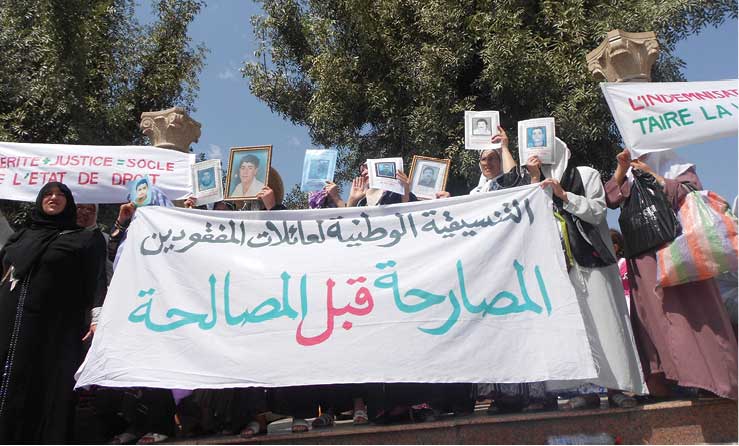
In 2016, we submitted to the UN Mechanisms 47 communications regarding 34 individuals.

ALGERIA
 Our Concerns
Our Concerns
- Undue restrictions on the rights to freedom of expression, peaceful assembly, and association;
- Repression and judicial harassment of activists and journalists;
- Continuous refusal to implement of the decisions of the Human Rights Committee relating to human rights violations committed during the 1990s;
- Violation of procedural guarantees, unfair trials, and the practice of arbitrary detention;
- Lack of independence of the judiciary and impunity for perpetrators of human rights violations.
 Recommendations
Recommendations
- Ensure respect for the rights to freedom of expression, peaceful assembly, and association;
- Put an end to all forms of repression against human rights activists and journalists;
- Investigate crimes committed during the civil war, and put an end to impunity by prosecuting perpetrators thereof;
- Repeal the Charter for Peace and National Reconciliation;
- Revise the Anti-Terrorism Law in order to bring it in line with international standards on fair trial rights and freedom of expression;
- Cooperate actively and in good faith with the UN Special Procedures and Treaty Bodies.
 Upcoming
Upcoming
- 8 May 2017: Third Universal Periodic Review of Algeria before the Human Rights Council;
- 20 June 2017: Five-year delay in the submission of Algeria’s fourth periodic report to the Committee against Torture;
- 1 November 2017: Six-year delay in the submission of Algeria’s fourth periodic report to the Human Rights Committee.
The continuous failure of the Algerian authorities to engage in sustainable legal, political, and economic reforms raises fear as to the imminence of a serious social and political crisis, as the country has not been able to diversify its economy and remains heavily reliant on hydrocarbons exportations. In the aftermath of the country’s civil war in the nineties, the government was able to buy social peace as a result of the revenue from oil and gas. However, the sharp decline in oil prices recently has significantly impacted the country’s economy and increased its fiscal deficits. On 7 February 2016, without prior discussion, the Parliament adopted the draft Constitution announced by President Bouteflika after the Arab uprisings of 2011. At the time, the President had promised to undertake deep constitutional reforms aimed at moving towards a more free and democratic society. The new Constitution was published in the Official Gazette – and therefore entered into effect – on 7 March 2016. Pursuant to article 179, the new Constitution reintroduces the constitutional two-term presidential limit, which President Bouteflika lifted in 2008 in order to be re-elected for a third term in April 2009. Although the independence of the judiciary is enshrined in article 156 of the new Constitution, the executive still plays a prominent role in the processes of judicial appointment and in the advancement of judicial careers. The Supreme Judicial Council itself is controlled by the executive, which appoints most of its members, thus strongly jeopardising the independence of judges.

Heightened crackdown on journalists and human rights defenders
If on one hand, the new Constitution reaffirms the rights to freedom of expression, peaceful assembly and association, on the other, legal provisions regulating these rights remain restrictive. Indeed, the provisions inherited from the state of emergency – which was lifted in February 2011 – remain in force, prohibiting demonstrations and public gatherings in Algiers and subjecting the creation of political parties and associations to the approval of the executive.
In 2016, Alkarama observed a resurgence of persecution against journalists and human rights activists, as well as a dangerous recourse to the judiciary to stifle dissenting voices and heavily punish public dissent and criticism. This practice has been facilitated by the Information Law No. 12-05 of 2012, which was denounced by civil society and UN experts as restricting the right to freedom of expression and information and for criminalising peaceful criticism of public officials under the pretext of “defamation”. Journalists and activists thus continue to face reprisals for speaking out about the authorities’ abuses and rampant corruption.
It is in this context that numerous bloggers and peaceful activists were prosecuted and sentenced for acts falling well within their right to freedom of expression. They were subjected to heavy sentences under articles 87 bis 4 and 5 of the Criminal Code, which sanctions “apology for terrorism” and any dissemination of documents deemed as “promoting terrorism” and provides for a broad and vague definition of the crime. On 24 November 2016, Alkarama seized the UN Special Rapporteur on the promotion and protection of human rights and fundamental freedoms while countering terrorism with the case of Adel Ayachi and Tijani Ben Derrah, two bloggers and human rights activists sentenced to imprisonment after one year of pre-trial detention on account of their alleged “apology for terrorism”. The two activists had been arrested following their participation in a peaceful sit-in held in Algiers to protest against repeated attacks on freedom of expression and to call for the release of Hassan Bouras.
On 28 November 2016, Hassan Bouras an independent journalist and member of the Algerian League for the Defence of Human Rights, was sentenced to one year in prison for “complicity of contempt of State institution” and “exercising the journalistic profession without previous authorisation”. The charges were issued after he interviewed two victims of police abuse and broadcasted their accounts on the Al Maghribia channel. The two victims were also convicted of “contempt of State institution”. The trial was held with a heavy police deployment as security forces surrounded the tribunal to avoid any demonstration.
Alkarama also documented the case of 42-year-old Mohamed Tamalt, who died on 11 December 2016 in the Bab-el-Oued hospital of Algiers following a long hunger strike and a three-month coma. The journalist, who was based in the United Kingdom, was arrested on 27 June 2016 in Algiers. On 11 July, he appeared before the Criminal Court of Algiers and was sentenced to two years imprisonment for “contempt of State institutions and to the person of the President”, having criticised the Algerian President and political dignitaries on Facebook. After his health severely deteriorated he was transferred from prison to the Bab-el-Oued hospital where neither his family nor his lawyers were allowed to visit him. They were similarly denied access to his medical record and thus unable to obtain any information on his condition.

Constant denial of the right to truth and justice for the families of the disappeared
On 30 August 2016, International Day of the Victims of Enforced Disappearances, Alkarama issued a public report to denounce the denial of the right to truth and justice for the families of the disappeared. More than 20 years after the beginning of the civil war triggered by the military coup of January 1992, families still do not know the fate or whereabouts of their relatives who were among the thousands of individuals abducted by the authorities. To this day, the authorities have refused to shed light on the fate of the disappeared in spite of the decisions and recommendations of the UN human rights mechanisms, urging them to tell the truth to the families, to investigate this mass crime, and to prosecute its perpetrators.
Today, the impact on the families of victims of enforced disappearances remains present and profound. Long stigmatised as “the families of terrorists” and constantly subjected to threats and reprisals, they continue to face the constant denial of their right to know the truth. 2016 marked ten years since the establishment of the “Charter for Peace and National Reconciliation”, which institutionalised the authorities’ denial of their responsibility for these crimes and imposed silence on the families.
In Algeria, the families of the disappeared can be prosecuted for peacefully demonstrating for their right to know the truth about the fate of their loved ones. For example, on 29 September 2016, Alkarama sent a communication to the UN Working Group on Enforced or Involuntary Disappearances (WGEID) following the violent arrest of 20 human rights defenders and relatives of disappeared persons who were peacefully demonstrating outside the National Assembly headquarters in Algiers to demand justice and truth about the fate and whereabouts of their relatives.

PRESSING ISSUES TO BE ADDRESSED DURING UPCOMING UNIVERSAL PERIODIC REVIEW
On 22 September 2016, Alkarama submitted its report on the human rights situation in Algeria to the Human Rights Council (HRC) in view of the State’s third Universal Periodic Review, which will be held in May 2017. The report includes 18 recommendations aimed at strengthening the authorities’ respect for human rights.
Among others, Alkarama raised the issue of serious violations of detainees’ fundamental rights, including the restriction of the right to communicate with one’s lawyer or family from the onset of the arrest, the absence of confidentiality of communication between lawyers and their clients, as well as the excessive length of custody period. Alkarama also raised concerns regarding the counterterrorism legal framework, which is based on a broad and particularly vague definition of terrorism, in virtue of which individuals can remain in custody for a period as long as 12 days.
Furthermore, Alkarama stressed that the Algerian authorities restrict and punish acts falling under the rights to freedom of opinion and expression, of peaceful assembly and of association. After the 2014 presidential election, several peaceful protest movements were violently suppressed by the authorities; arresting numerous individuals, including journalists and other media workers critical of the government. Alkarama recalled that “unarmed gatherings” are still criminalised under article 98 of the Criminal Code and that despite the end of the state of emergency in 2011, peaceful demonstrations are still forbidden in the capital.
Associations also remain under strict executive scrutiny since the current legislation provides the Ministry of Interior with discretionary power to refuse the registration of an association under the pretext that it does not comply with “national values, public order, public decency and the provisions of existing legislation”.
Lastly, Alkarama highlighted the fact that the authorities constantly refuse to cooperate with the UN Special Procedures and Treaty Bodies, thereby severely hindering the right to redress of victims and their families. Indeed, to date, none of the decisions issued by the HRCtee has been implemented and despite numerous reminders, the visit requested by the WGEID in 2006 has still not been conducted.